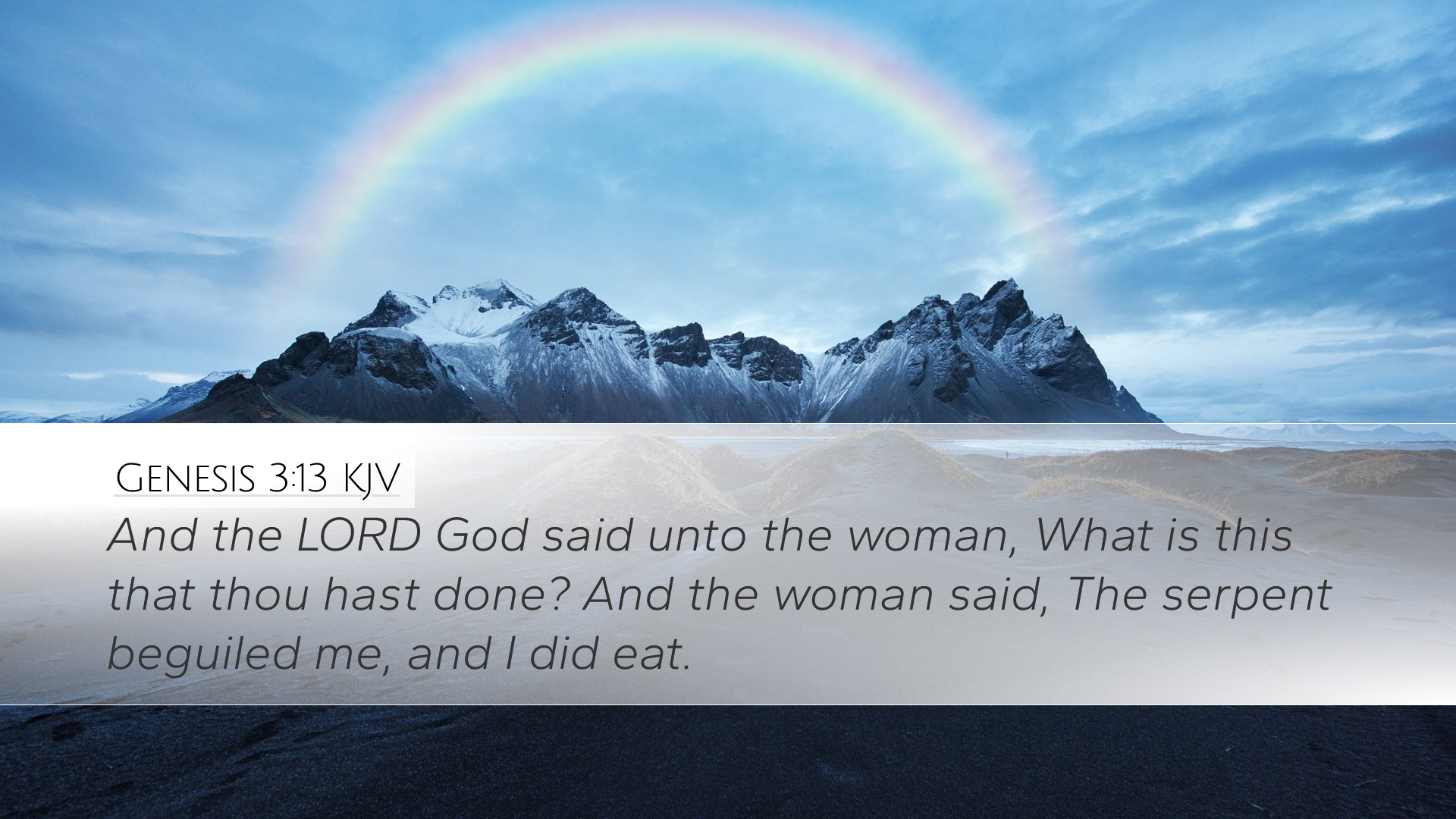Commentary on Genesis 3:13
“And the Lord God said unto the woman, What is this that thou hast done? And the woman said, The serpent beguiled me, and I did eat.”
Introduction
This verse marks a pivotal moment in the narrative of the Fall. It reveals not only the immediate consequences of sin but also the dynamics of blame and responsibility that emerge from disobedience. The inquiry by God and the response from Eve unveil profound theological truths about human nature, temptation, and the nature of sin.
The Divine Inquiry
“What is this that thou hast done?” The question posed by God is deeply significant. It is not merely an inquiry for information, as God, being omniscient, already knows the answer. Rather, it serves multiple purposes:
- Confrontation: God's question confronts Eve with the reality of her sin, prompting her to reflect on her actions.
- Responsibility: This inquiry calls Eve to acknowledge her personal responsibility in the transgression.
- Clarification: It seeks to clarify the nature of her disobedience in the broader scope of God's creation and intention.
Eve’s Response
Eve's answer, “The serpent beguiled me, and I did eat,” is vital to understanding the unfolding drama. Her response provides insight into several key themes:
- Deception: Eve acknowledges that she was deceived by the serpent. This admission highlights the reality of temptation and the cunning nature of evil.
- Passing the Blame: Eve's response includes a shift of accountability, indicative of a common human tendency to evade responsibility by blaming external factors.
- Human Vulnerability: The admission also illustrates human frailty; Eve was led astray, demonstrating how susceptible humanity can be to deception.
Theological Implications
This verse is rich with theological implications, particularly concerning the nature of sin and its effects on human relationships with God and one another:
- The Nature of Sin: Sin leads to a rupture in the relationship between humanity and God, fostering a cycle of blame rather than repentance.
- The Need for Redemption: This opening narrative sets the stage for the necessity of redemption through Christ, who comes to restore what was lost through disobedience.
- Human Accountability: Despite Eve’s attempt to shift blame, personal accountability remains fundamental; each person will ultimately answer for their own actions before God.
Comparative Analysis: Commentators' Insights
Insights from noted biblical commentators deepen our understanding of this passage:
Matthew Henry
Henry emphasizes that God’s question is not for His benefit but for Eve’s. By asking, God leads her to consider the enormity of her actions and the consequences they entail. Henry points out that human nature often seeks to shift blame, as evident in Eve's response.
Albert Barnes
Barnes highlights the significance of the word “beguiled” used by Eve, noting that it suggests an overwhelming effect of deception. He elaborates on the serpent's role as a tempter and emphasizes the idea of yielding to temptation as a critical failure of the will.
Adam Clarke
Clarke remarks on the nature of the serpent and its cunning ways, demonstrating the dangers of neglecting God’s warnings. He underscores Eve’s confession as a step towards understanding the consequences of her action, marking the beginning of human acknowledgment of sin.
Conclusion
Genesis 3:13 serves as a foundational text not only in the narrative of the Fall but also in understanding the complexities of human nature, sin, and the enormity of divine grace. This moment of inquiry and confession reveals both the depths of human failure and the need for a Savior. For pastors, theologians, and scholars, it underscores the continuing relevance of biblical truths in confronting modern issues of responsibility, temptation, and the nature of evil.


